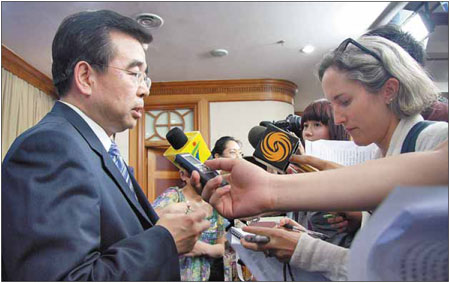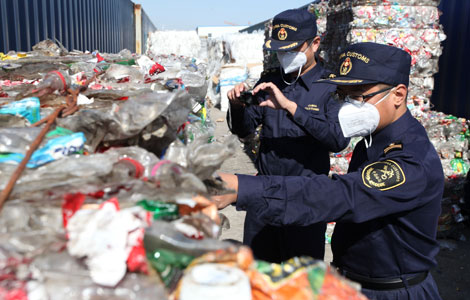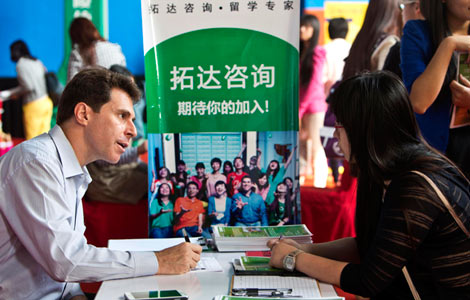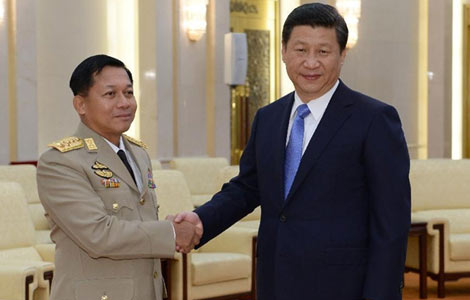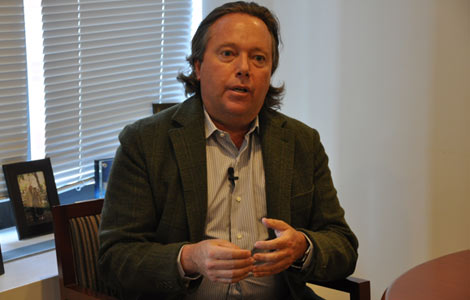Time to get straight to the point
Updated: 2013-10-17 07:23
By Tang Yue and Cao Yin (China Daily USA)
|
||||||||
Government spokespeople aim to improve transparency of information, Tang Yue and Cao Yin report in Beijing.
The Chinese government has moved to improve the transparency of official information through a radical overhaul of the system whereby departmental spokespeople explain government policy.
The move follows an announcement by the State Council on Tuesday urging officials to adapt to the Internet age by releasing information in a timely, comprehensive and accurate manner.
On Wednesday, Cai Mingzhao, minister of the State Council Information Office, said at a media briefing that the time has come to formulate and enforce detailed regulation of the system, including entry tests for applicants.
In addition, government departments will be required to establish groups of experts to outline policy in greater depth and reply to questions posed by the public in response to information published on the Internet, Cai said.
"Just posting information on time does not mean we are taking the initiative. Providing detailed and considered explanations of what we disclose is more important," he said.
Many experts and spokespeople said the move is long overdue and cited the inexperience and insufficient subject knowledge of many spokespeople as major hurdles to be overcome.
Untrained, untested
The story of Mao Qun'an illustrates the dilemmas faced by many official spokespeople in the past.
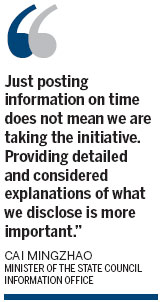
Although he had never given a press interview or spoken on TV or radio, the 2003 outbreak of Severe Acute Respiratory Syndrome saw Mao thrust into the spotlight during daily media briefings shown on live television.
Mao, who majored in traditional Chinese medicine and worked in the general office of what was then the Ministry of Health, was a member of a team required to issue information about the outbreak at 4 pm every day from April to June.
"I had no experience as a spokesperson and it put me under the greatest pressure I had ever experienced," recalled the 50-year-old.
None of his colleagues had media experience either, because at that time many spokespeople for ministry-level departments disseminated policy details exclusively through unsigned news releases.
The SARS outbreak claimed 349 lives in China and left many survivors with lifelong ailments, with those related to the bones and lungs especially prominent. Part of the outbreak's legacy was the realization that government communications needed to be more transparent and issued by qualified personnel.
A decade later, trained spokespeople have sprung up at various levels of government and Party organs.
The spokesperson system has been instrumental in keeping the public well informed and in pushing for more in-depth information in a political culture long dominated by a philosophy best described as "Silence is golden", according to experts.
But not all official spokespeople function effectively and their statements often leave more questions than answers, either because they are concerned that an inappropriate comment could ruin their careers or because they simply don't have access to relevant information under the existing system, despite their status and job title, said pundits.
"More governmental bodies have spokespeople now, but there are also many 'unspoken spokespeople', those who make a virtue of saying nothing," said Wang Xuming, a spokesman for the Ministry of Education from 2003 to 2008.
"Most spokespeople are still like robots, reading a prepared statement with no distinctive personal style at all," said Wang, who was well known in media circles for his outspoken, individual approach to his work.
Almost three months after the end of the daily SARS briefings, both Mao and Wang joined more than a hundred other spokespeople from a number of national departments and provincial governments on a five-day training course presided over by communications experts and senior reporters from China and overseas.
However, 19 of the attendees have never spoken to the media since, according to Beijing News.
Individuals vs the system
Unlike their Western counterparts, most of whom have a background in journalism, the majority of Chinese spokespeople started their careers as bureaucrats. As such, it's harder for them to think with a media perspective and they usually only put forward a defense of government actions and policies, said Shi Anbin, professor of media studies at Tsinghua University in Beijing.
Their professional immaturity was highlighted and magnified in the aftermath of the Wenzhou rail accident in 2011, when two high-speed trains collided, claiming 40 lives and injuring nearly 200 people.
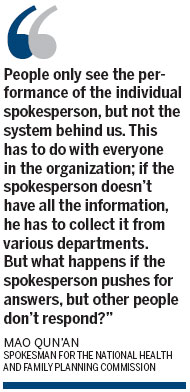
After explaining that the front of one of the trains had been buried a short while after the incident as a measure to ease conditions for rescue workers - a move that triggered widespread public dismay because the carriage still contained many bodies - Wang Yongping, the spokesman for the Ministry of Railways, told reporters, "Whether you believe it (the explanation) or not, I believe it."
The public was outraged by Wang's statement and he was later removed from his post.
"People only see the performance of the individual spokesperson, but not the system behind us," said Mao, who is now the spokesman for the National Health and Family Planning Commission.
"This has to do with everyone in the organization; if the spokesperson doesn't have all the information, he has to collect it from various departments. But what happens if the spokesperson pushes for answers, but other people don't respond?"
Also, because Chinese spokespeople are usually administration officials of varying rank, rather than media professionals, they are unable to attend high-level meetings and therefore often lack the necessary information or experience that would be helpful when dealing with the media, said Hu Zhengrong, vice-president of the Communications University of China.
"We have regulations regarding the transparency of government information, but they aren't fully implemented. That's why still many people find our government mysterious," said Hu.
"Of course, we can't release State secrets. No government in the world does that, but we are still too conservative in many areas."
Credibility gap
While the government often fails to respond to matters of public concern quickly enough, it sometimes gives an impression of being in a rush to comment on specific cases, noted Hu.
In one famous case, after a reporter blew the whistle on allegedly corrupt acts by Liu Tienan, who was then chief of the National Energy Administration, on the Internet in December, the administration's spokesman refuted the story just four hours later, declaring it "nonsense". However, Liu was later sacked from his post and is now under official investigation.
"Things like that do great harm to the credibility of spokespeople," said Hu.
Shi Anbin, one of the teachers at the 2003 training camp, said that during the past decade, the scope of those attending his media training courses has widened from spokespeople working for the central government, to those in local departments, and, more latterly, the politicians themselves. In the last 10 years he has trained more than 10,000 people.
He noted that while an ability to deal with the media is a basic qualification for politicians in the West, many in China still have limited knowledge and experience.
"Some attendees have been mayors for 20 years, but have never talked on TV - that would be beyond imagining in the US. In the era of the Internet, it is outdated for senior officials not to have social media accounts," he said.
In a speech at the Central Party School in 2009, Xi Jinping, the then principal, asked officials to improve their ability to deal with the media, a move related to the stability of the Party's ruling status.
"More officials with spokesperson experience are promoted now. And hopefully, that will encourage more people to speak to the media and break away from the traditions of 'Silence is golden' and 'Loose lips sink ships'," said Shi.
Contact the writers at tangyue@chinadaily.com.cn and caoyin@chinadaily.com.cn
Shan Juan, Yang Wanli and Zhao Xu contributed to this story
|
This 2009 photo shows Mao Qun'an, then spokesman for the Ministry of Health, taking questions after a news briefing. Provided to China Daily |
|
From left to right: Geng Yansheng, Defense Ministry spokesman; Yao Jian, Ministry of Commerce spokesman; Wang Yongping, Ministry of Railways spokesman in 2011; Hua Chunying, Ministry of Foreign Affairs spokeswoman; Wang Xuming, former spokesman for the Ministry of Education. |
(China Daily USA 10/17/2013 page7)
Most Viewed
Editor's Picks

|

|

|

|

|

|
Today's Top News
US debt impasse ending, Obama to sign bill
Facebook goes fishing in China
Michigan auto czar leading trade trip to China
Yuan gains the most in 20 years
Tibet avalanche claims 4
First interprovince subway route opens
US expert finds job 'rewarding'
Trending news across China
US Weekly

|

|
